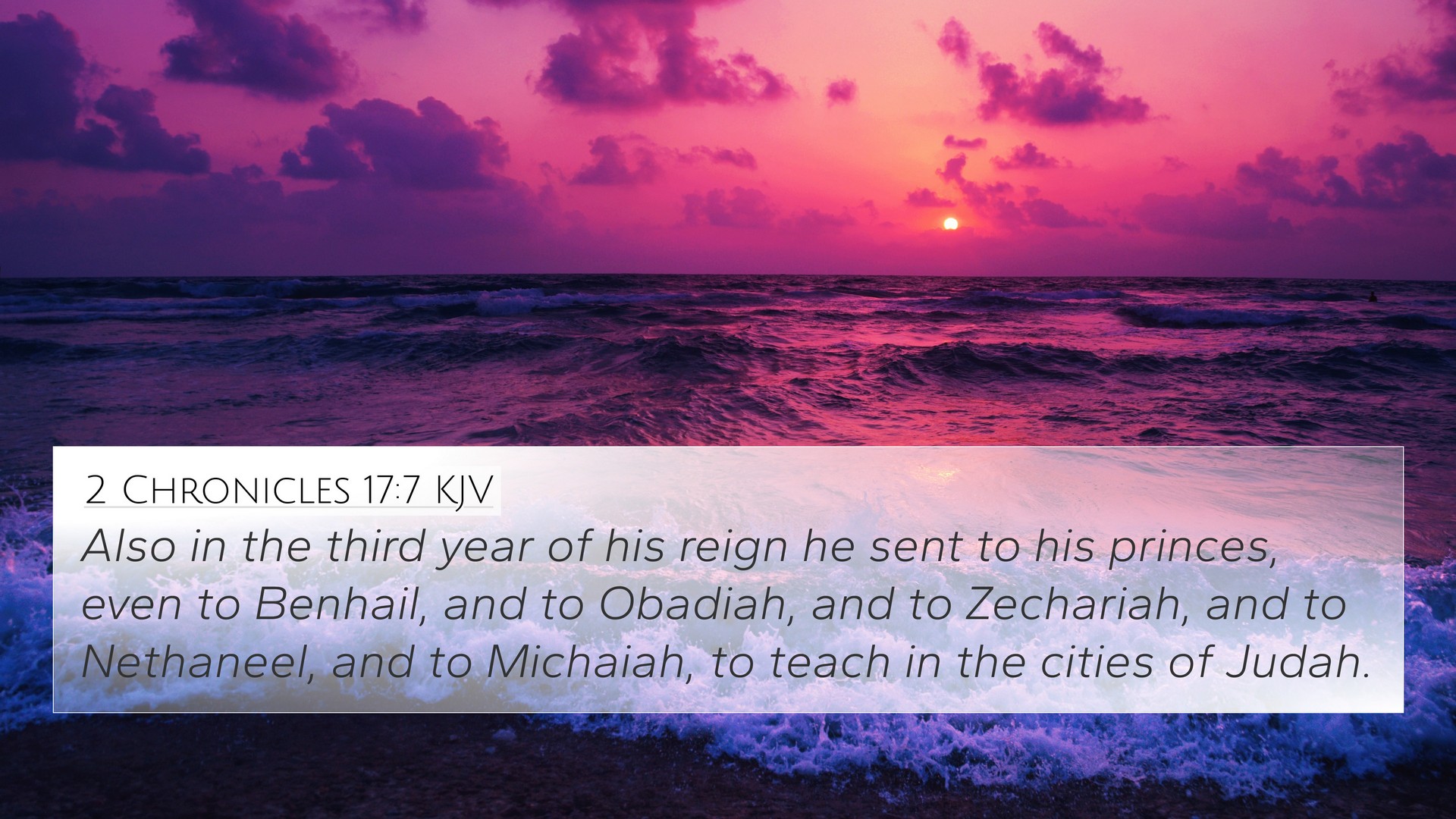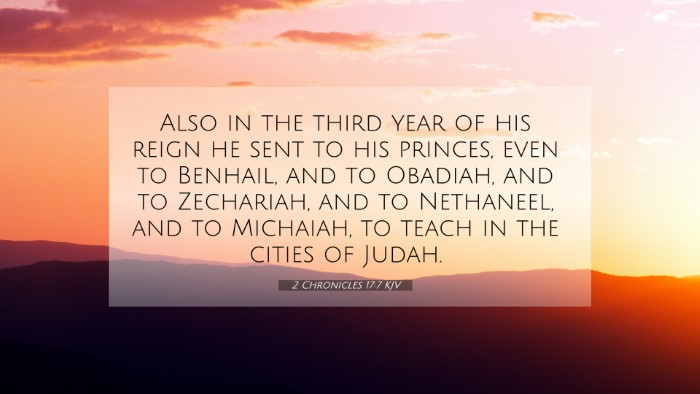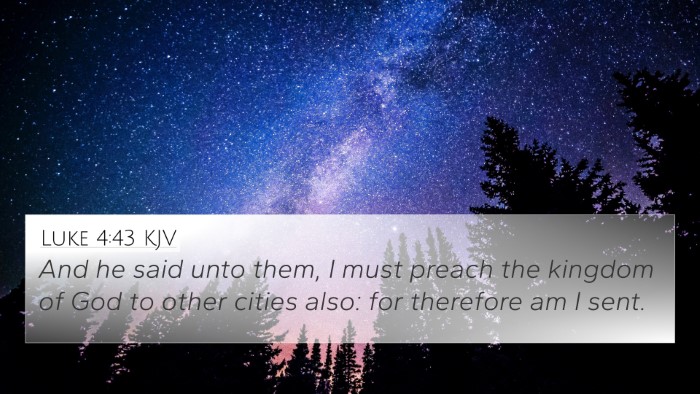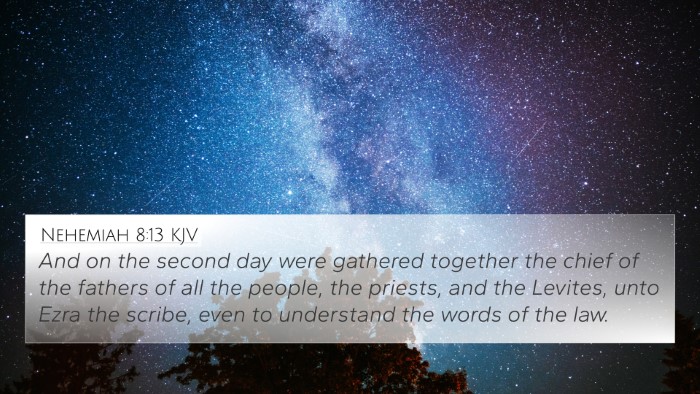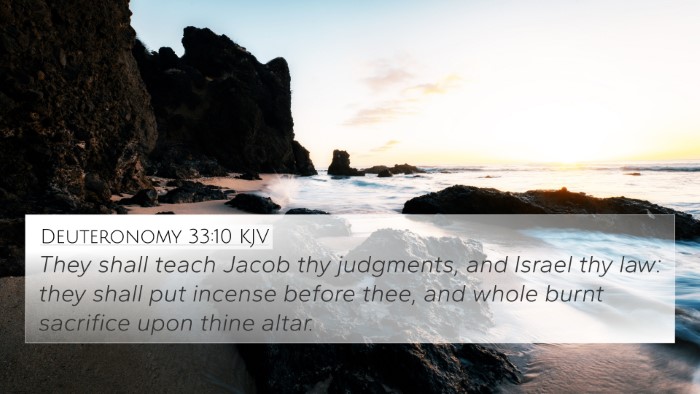Understanding 2 Chronicles 17:7
The verse 2 Chronicles 17:7 states the following: "Also in the third year of his reign he sent to his princes, even to Benhail, and to Obadiah, and to Zechariah, and to Nethaneel, and to Micaiah, to teach in the cities of Judah." This verse marks a pivotal moment in the reign of Jehoshaphat, king of Judah, highlighting his commitment to religious reform and the education of the people in the laws of God.
Context and Background
Jehoshaphat became king after his father, Asa, and received the throne during a time of relative peace. His reign is characterized by efforts to strengthen Judah spiritually and politically. In this verse, we see his initiative to spread knowledge of God's Law, demonstrating his priority to cultivate a spiritually informed populace.
Insights from Commentaries
Matthew Henry's Commentary
Matthew Henry emphasizes the importance of teaching and the role of leaders in spiritual guidance. He notes that Jehoshaphat's action of sending teachers reflects a proactive approach to leadership, suggesting that spiritual growth should be actively fostered. The choice of teachers highlights the need for wise men to guide the people in understanding God's statutes.
Albert Barnes' Commentary
Albert Barnes points out the significance of Jehoshaphat's intention to educate the people. He identifies this initiative as a method of promoting the knowledge of God’s Law, which was essential for societal stability and moral integrity. By appointing specific individuals, Jehoshaphat was ensuring that the teachings were thorough and accurate, fostering a culture of learning and obedience to God's commands.
Adam Clarke's Commentary
Adam Clarke provides insight into the names of the individuals appointed as teachers. He suggests that these men were respected leaders who would likely have the trust and attention of the community. Clarke highlights that the cities of Judah would benefit from this initiative, serving as a foundational aspect of Jehoshaphat's reign.
Significance of the Verse
This verse is notable because it illustrates an early form of structured education regarding spiritual matters in ancient Israel. The emphasis on teaching reflects a deep understanding of the need for continuous learning in the faith and the responsibility of leaders to guide their followers.
Bible Verse Cross-References
- Deuteronomy 6:6-7: Instructions to teach God's commandments diligently to children.
- 2 Chronicles 15:3: A mention of Israel being without the true God and instruction.
- Nehemiah 8:8: The people receiving understanding through the reading of the Law.
- Titus 2:1-3: The importance of teaching sound doctrine.
- Ephesians 4:11-13: God gives teachers to equip the saints for ministry.
- Psalm 119:105: The Law as a lamp unto our feet and light unto our path.
- Matthew 28:19-20: The Great Commission to make disciples and teach them.
Thematic Connections
The actions of Jehoshaphat resonate with various themes throughout Scripture. The emphasis on teaching and adhering to God's Law is a recurrent theme. Leaders throughout the Bible, from Moses to the apostles, exhibit a consistent commitment to educating and guiding their communities.
Inter-Biblical Dialogue
This verse invites discussions about the connecting threads between different Biblical texts. For instance, the focus on teaching in 2 Chronicles 17:7 parallels the instructions given in the New Testament about making disciples, demonstrating the continuity of God's desire for His people to be informed and obedient.
Conclusion
In summary, 2 Chronicles 17:7 highlights a transformative moment in Judah under King Jehoshaphat’s reign. It underlines the significance of teaching and adhering to God's Law as foundational to spiritual and societal health. By cross-referencing this verse with others, one can gain a deeper understanding of the importance of doctrinal instruction throughout both the Old and New Testaments.
